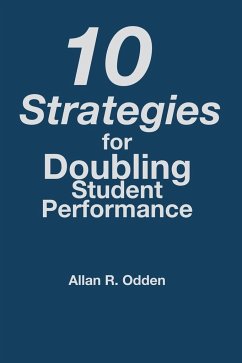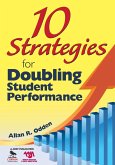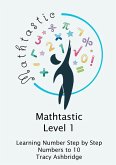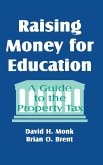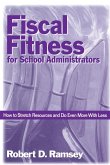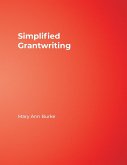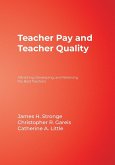Allan R. Odden
10 Strategies for Doubling Student Performance
Allan R. Odden
10 Strategies for Doubling Student Performance
- Gebundenes Buch
- Merkliste
- Auf die Merkliste
- Bewerten Bewerten
- Teilen
- Produkt teilen
- Produkterinnerung
- Produkterinnerung
[header tag]Research-based strategies for turning around low-performing schools! With case studies and tools, this companion book to Doubling Student Performance expands on ten research-based strategies for driving significant, measurable gains in student achievement.
Andere Kunden interessierten sich auch für
![10 Strategies for Doubling Student Performance 10 Strategies for Doubling Student Performance]() Allan R. Odden10 Strategies for Doubling Student Performance41,99 €
Allan R. Odden10 Strategies for Doubling Student Performance41,99 €![Mathtastic Level 1 Numbers to 10 Mathtastic Level 1 Numbers to 10]() Tracy AshbridgeMathtastic Level 1 Numbers to 1049,99 €
Tracy AshbridgeMathtastic Level 1 Numbers to 1049,99 €![Teaching Strategies for Neurodiversity and Dyslexia in Actor Training Teaching Strategies for Neurodiversity and Dyslexia in Actor Training]() Petronilla WhitfieldTeaching Strategies for Neurodiversity and Dyslexia in Actor Training204,99 €
Petronilla WhitfieldTeaching Strategies for Neurodiversity and Dyslexia in Actor Training204,99 €![Raising Money for Education Raising Money for Education]() David H. MonkRaising Money for Education64,99 €
David H. MonkRaising Money for Education64,99 €![Fiscal Fitness for School Administrators Fiscal Fitness for School Administrators]() Robert D. RamseyFiscal Fitness for School Administrators38,99 €
Robert D. RamseyFiscal Fitness for School Administrators38,99 €![Simplified Grantwriting Simplified Grantwriting]() Mary Ann BurkeSimplified Grantwriting36,99 €
Mary Ann BurkeSimplified Grantwriting36,99 €![Teacher Pay and Teacher Quality Teacher Pay and Teacher Quality]() James H. StrongeTeacher Pay and Teacher Quality41,99 €
James H. StrongeTeacher Pay and Teacher Quality41,99 €-
-
-
[header tag]Research-based strategies for turning around low-performing schools! With case studies and tools, this companion book to Doubling Student Performance expands on ten research-based strategies for driving significant, measurable gains in student achievement.
Hinweis: Dieser Artikel kann nur an eine deutsche Lieferadresse ausgeliefert werden.
Hinweis: Dieser Artikel kann nur an eine deutsche Lieferadresse ausgeliefert werden.
Produktdetails
- Produktdetails
- Verlag: Corwin
- Seitenzahl: 192
- Erscheinungstermin: 7. Oktober 2009
- Englisch
- Abmessung: 260mm x 183mm x 15mm
- Gewicht: 567g
- ISBN-13: 9781412971478
- ISBN-10: 1412971470
- Artikelnr.: 26259340
- Herstellerkennzeichnung
- Libri GmbH
- Europaallee 1
- 36244 Bad Hersfeld
- gpsr@libri.de
- Verlag: Corwin
- Seitenzahl: 192
- Erscheinungstermin: 7. Oktober 2009
- Englisch
- Abmessung: 260mm x 183mm x 15mm
- Gewicht: 567g
- ISBN-13: 9781412971478
- ISBN-10: 1412971470
- Artikelnr.: 26259340
- Herstellerkennzeichnung
- Libri GmbH
- Europaallee 1
- 36244 Bad Hersfeld
- gpsr@libri.de
Allan Odden is Co-Director of Strategic Management of Human Capital (SMHC) in public education, a project of the Consortium for Policy Research in Education (CPRE). SMHC seeks to improve student performance through talented teachers and school leaders and improved instructional practices produced by SMHC, focusing initially on large urban districts. He also is Professor of Educational Leadership and Policy Analysis at the University of Wisconsin-Madison. He also is Co-Director of the Consortium for Policy Research in Education (CPRE). CPRE is a consortium of the University of Wisconsin-Madison, Pennsylvania, Harvard, Michigan, Northwestern, Teachers College-Columbia University, and Stanford Universities. He formerly was professor of education policy and administration at the University of Southern California (1984-1993) and Director of Policy Analysis for California Education (PACE), an education policy consortium of USC, Stanford and the University of California, Berkeley. He is an international expert on the management of human capital in education, teacher compensation, education finance, school-based financing, resource allocation and use, educational policy, school-based management, and educational policy implementation. He worked with the Education Commission of the States for a decade, serving as assistant executive director, director of policy analysis and research, and director of its educational finance center. He was president of the American Educational Finance Association in 1979-80 and received AEFA's distinguished Service Award in 1998. He served as research director for special state educational finance projects in Connecticut (1974-75), Missouri (1975-77), South Dakota (1975-77), New York (1979-81), Texas (1988), New Jersey (1991), Missouri (1992-93), the Joint Interim Task Force on School Finance Adequacy in Arkansas (2003, 2005), the Wyoming Select Committee on Finance (2005), Washington Learns (2006) and Wisconsin (2005-2007). He was appointed Special Court Master to the Remand Judge in the New Jersey Abbott v. Burke school finance court case for 1997 and 1998. He has worked on teacher compensation changes in dozens of states and districts,. He currently is directing research projects on school finance adequacy, school finance redesign, resource reallocation in schools, the costs of instructional improvement, teacher compensation and the strategic management of human capital in public education. Odden has written widely, publishing over 200 journal articles, book chapters, and research reports, and 32 books and monographs. He has consulted for governors, state legislators, chief state school officers, national and local unions, The National Alliance for Business, the Business Roundtable, New American Schools, the U.S. Congress, the U.S. Secretary of Education, many local school districts, the state departments of education in Victoria and Queensland, Australia, and the Department for Education and Employment in England. His most recent books include School Finance: A Policy Perspective (McGraw Hill, 2008, 4th edition), with Lawrence O. Picus and How to Create World Class Teacher Compensation (Freeload Press, 2007) with Marc Wallace. Other books include Paying Teachers for What They Know and Do: New and Smarter Compensation Strategies to Improve Schools (Corwin Press, 1997, 2nd Edition, 2002) with Carolyn Kelley; Reallocating Resources: How to Boost Student Achievement Without Spending More (Corwin, 2001) with Sarah Archibald; School Finance: A Policy Perspective (McGraw Hill, 1992, 2nd Edition, 2000, 3rd Edition 2004) co-authored with Lawrence Picus; School-Based Finance (Corwin Press, 1999), edited with Margaret Goertz; Financing Schools for High Performance: Strategies for Improving the Use of Educational Resources (Jossey Bass, 1998) with Carolyn Busch; Educational Leadership for America's Schools (McGraw Hill, 1995); Rethinking School Finance: An Agenda for the 1990s (Jossey-Bass, 1992); Education Policy Implementation (State University of New York Press, 1991); and School Finance and School Improvement: Linkages for the 1980s (Ballinger, 1983). He was a mathematics teacher and curriculum developer in New York City's East Harlem for 5 years. He received his Ph.D. and M.A. degrees from Columbia University, a Masters of Divinity from the Union Theological Seminary and his B.S. in aerospace engineering from Brown University. He is married, has two children, and one grand child.
Preface
Acknowledgments
About The Author
1. Understanding the Performance Challenge
Pressure to Improve Performance
Analyzing State Student Test Data
Conducting Curriculum Standards Audits
Summary
2. Set Ambitious Goals
Beyond Motivational Theory
Beyond the Soft Bigotry of Low Expectations
Setting Very High Goals
Thinking Big Is Quintessentially American
Summary
3. Change the Curriculum Program and Create a New Instructional Vision
Adopting New Textbooks and Instructional Visions
Assessing Effectiveness of Curriculum and Instructional Approaches
Collaborative Work
Summary
4. Benchmark and Formative Assessments and Data-Based Decision Making
Overview of Benchmark and Formative Assessments
Benchmark and Formative Assessments in Montgomery County, Maryland
A Comment on Value-Added Measures
Summary
5. Provide Ongoing, Intensive Professional Development
The Features of Effective Professional Development
Examples of Professional Development Programs
Summary
6. Using Time Efficiently and Effectively
Extending the School Year and Day
Better Uses of Time
Summary
7. Extend Learning Time for Struggling Students
Some Contextual Points
Time During the Regular School Day
Time Outside the Regular School Day but Within the Regular School Year
Time Outside the Regular School Year
Summary
8. Collaborative Cultures and Distributed Leadership
A Collaborative School Culture
Structuring Collaborative Cultures
Distributed Leadership
Summary
9. Professional and Best Practices
Indicators of Acting Professionally
Not Doing It Alone
Summary
10. The Human Capital Side of Doubling Student Performance
Overview
First, Recruit Top Talent
Second, Develop Top Talent
Sometimes Initial Talent Turnover Is Required
Summary
11. Putting It All Together: The Dramatically Improving School
The 10 Core Elements of the Improving School
Summary
The Kennewick Approach to Dramatic Improvement
References
Acknowledgments
About The Author
1. Understanding the Performance Challenge
Pressure to Improve Performance
Analyzing State Student Test Data
Conducting Curriculum Standards Audits
Summary
2. Set Ambitious Goals
Beyond Motivational Theory
Beyond the Soft Bigotry of Low Expectations
Setting Very High Goals
Thinking Big Is Quintessentially American
Summary
3. Change the Curriculum Program and Create a New Instructional Vision
Adopting New Textbooks and Instructional Visions
Assessing Effectiveness of Curriculum and Instructional Approaches
Collaborative Work
Summary
4. Benchmark and Formative Assessments and Data-Based Decision Making
Overview of Benchmark and Formative Assessments
Benchmark and Formative Assessments in Montgomery County, Maryland
A Comment on Value-Added Measures
Summary
5. Provide Ongoing, Intensive Professional Development
The Features of Effective Professional Development
Examples of Professional Development Programs
Summary
6. Using Time Efficiently and Effectively
Extending the School Year and Day
Better Uses of Time
Summary
7. Extend Learning Time for Struggling Students
Some Contextual Points
Time During the Regular School Day
Time Outside the Regular School Day but Within the Regular School Year
Time Outside the Regular School Year
Summary
8. Collaborative Cultures and Distributed Leadership
A Collaborative School Culture
Structuring Collaborative Cultures
Distributed Leadership
Summary
9. Professional and Best Practices
Indicators of Acting Professionally
Not Doing It Alone
Summary
10. The Human Capital Side of Doubling Student Performance
Overview
First, Recruit Top Talent
Second, Develop Top Talent
Sometimes Initial Talent Turnover Is Required
Summary
11. Putting It All Together: The Dramatically Improving School
The 10 Core Elements of the Improving School
Summary
The Kennewick Approach to Dramatic Improvement
References
Preface
Acknowledgments
About The Author
1. Understanding the Performance Challenge
Pressure to Improve Performance
Analyzing State Student Test Data
Conducting Curriculum Standards Audits
Summary
2. Set Ambitious Goals
Beyond Motivational Theory
Beyond the Soft Bigotry of Low Expectations
Setting Very High Goals
Thinking Big Is Quintessentially American
Summary
3. Change the Curriculum Program and Create a New Instructional Vision
Adopting New Textbooks and Instructional Visions
Assessing Effectiveness of Curriculum and Instructional Approaches
Collaborative Work
Summary
4. Benchmark and Formative Assessments and Data-Based Decision Making
Overview of Benchmark and Formative Assessments
Benchmark and Formative Assessments in Montgomery County, Maryland
A Comment on Value-Added Measures
Summary
5. Provide Ongoing, Intensive Professional Development
The Features of Effective Professional Development
Examples of Professional Development Programs
Summary
6. Using Time Efficiently and Effectively
Extending the School Year and Day
Better Uses of Time
Summary
7. Extend Learning Time for Struggling Students
Some Contextual Points
Time During the Regular School Day
Time Outside the Regular School Day but Within the Regular School Year
Time Outside the Regular School Year
Summary
8. Collaborative Cultures and Distributed Leadership
A Collaborative School Culture
Structuring Collaborative Cultures
Distributed Leadership
Summary
9. Professional and Best Practices
Indicators of Acting Professionally
Not Doing It Alone
Summary
10. The Human Capital Side of Doubling Student Performance
Overview
First, Recruit Top Talent
Second, Develop Top Talent
Sometimes Initial Talent Turnover Is Required
Summary
11. Putting It All Together: The Dramatically Improving School
The 10 Core Elements of the Improving School
Summary
The Kennewick Approach to Dramatic Improvement
References
Acknowledgments
About The Author
1. Understanding the Performance Challenge
Pressure to Improve Performance
Analyzing State Student Test Data
Conducting Curriculum Standards Audits
Summary
2. Set Ambitious Goals
Beyond Motivational Theory
Beyond the Soft Bigotry of Low Expectations
Setting Very High Goals
Thinking Big Is Quintessentially American
Summary
3. Change the Curriculum Program and Create a New Instructional Vision
Adopting New Textbooks and Instructional Visions
Assessing Effectiveness of Curriculum and Instructional Approaches
Collaborative Work
Summary
4. Benchmark and Formative Assessments and Data-Based Decision Making
Overview of Benchmark and Formative Assessments
Benchmark and Formative Assessments in Montgomery County, Maryland
A Comment on Value-Added Measures
Summary
5. Provide Ongoing, Intensive Professional Development
The Features of Effective Professional Development
Examples of Professional Development Programs
Summary
6. Using Time Efficiently and Effectively
Extending the School Year and Day
Better Uses of Time
Summary
7. Extend Learning Time for Struggling Students
Some Contextual Points
Time During the Regular School Day
Time Outside the Regular School Day but Within the Regular School Year
Time Outside the Regular School Year
Summary
8. Collaborative Cultures and Distributed Leadership
A Collaborative School Culture
Structuring Collaborative Cultures
Distributed Leadership
Summary
9. Professional and Best Practices
Indicators of Acting Professionally
Not Doing It Alone
Summary
10. The Human Capital Side of Doubling Student Performance
Overview
First, Recruit Top Talent
Second, Develop Top Talent
Sometimes Initial Talent Turnover Is Required
Summary
11. Putting It All Together: The Dramatically Improving School
The 10 Core Elements of the Improving School
Summary
The Kennewick Approach to Dramatic Improvement
References

